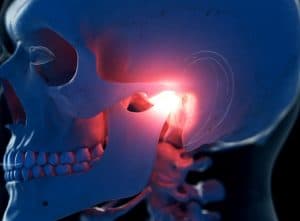 Many of the most common dental health problems you can experience are relatively simple to identify. For instance, if your tooth begins to feel sensitive or develops a toothache, then the problem is often the beginning stages of a cavity. If your gums bleed slightly when you brush and floss your teeth, then they may be in the early stages of gingivitis. The problem with TMJ disorder, however, is that the potential symptoms it can lead to aren’t always as easily identifiable as the signs of other conditions. Identifying TMJ pain and the disorder behind it might not be simple on your own, but fortunately, your dentist can help you determine if you might benefit from customized TMJ treatment.
Many of the most common dental health problems you can experience are relatively simple to identify. For instance, if your tooth begins to feel sensitive or develops a toothache, then the problem is often the beginning stages of a cavity. If your gums bleed slightly when you brush and floss your teeth, then they may be in the early stages of gingivitis. The problem with TMJ disorder, however, is that the potential symptoms it can lead to aren’t always as easily identifiable as the signs of other conditions. Identifying TMJ pain and the disorder behind it might not be simple on your own, but fortunately, your dentist can help you determine if you might benefit from customized TMJ treatment.
Why recognizing TMJ disorder is difficult
TMJ disorder affects the joints that control your jaw movement, which are known as temporomandibular joints (or TMJs). Yet, the specific way in which TMJ disorder impacts these joints can differ between patients, and as a result, the symptoms can also differ greatly. Some patients may experience chronic headaches along with popping and clicking in their jaw joints. Others might develop tinnitus (pain and ringing in both ears) without any noticeable discomfort in their jaws. Recognizing TMJ disorder by just one specific symptom can be difficult. However, if you experience multiple types of chronic discomfort in your oral and facial, then it may be worth mentioning it to your dentist during your next visit.
Contributing factors to look out for
TMJ disorder can develop in a number of different ways, and the factors that could contribute to it can also vary greatly. For many patients with TMJ disorder, the cause is related to the overall function of their bite and, particularly, the alignment and pressure that their TMJs are exposed to as they bite and chew. This may be the result of tooth misalignment throwing your bite off-balance, or a discrepancy in how one of your TMJs moves when you bite and chew. If you experience tooth alignment concerns, or bite problems that place your jaws under immense pressure (such as chronic teeth-grinding), then these may be contributing factors to your chronic TMJ pain.
Gauging the function of your TMJs
If you believe that you might be experiencing chronic TMJ pain, then it’s important to have your dentist perform a comprehensive examination to determine if you are. By analyzing your bite and tooth alignment, as well as the function of your jaws when you open and close your mouth, your dentist can help you determine if TMJ disorder is the cause. If it is, then your dentist will work with you to determine how to address the contributing factors to it and hep you find permanent relief from your TMJ pain.
Find out if you need TMJ treatment
One of the biggest challenges to dealing with TMJ disorder is often identifying your aches and pains as signs of a jaw dysfunction. To learn more, schedule your appointment by calling Healthy Smiles in Gary, IN, today at 219-938-2637.



